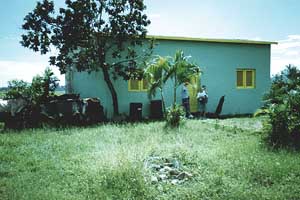Student instrumental in bringing printed word to Dominican batey
By Carrie GolusNews Office
 |
In the fall of 2000, when Rachel Cole started teaching at a migrant worker camp, or batey, in the Dominican Republic, she found herself in a community isolated from Dominican society, where the printed word was almost entirely absent.
Coming from a culture where print is everywhere––magazines, Web sites and advertisements, not to mention the millions of books available in libraries––Cole found its absence startling. “Beyond not having books in their homes––if anyone had a book, it would be the Bible––there were no advertisements or signs, because so few people in the batey can read,” she said.
A fourth-year concentrating in anthropology and economics, Cole set out to change the situation. After her volunteer job ended in the spring––she had been teaching children ages 5 to 8 in a preschool run by a Catholic charity––Cole stayed on to help establish the first library in the batey. “Our program had a lot of books, but what we wanted was a separate building,” she said.
 Rachel Cole, a fourth-year concentrating in anthropology and economics, helped establish the first library in the Dominican Republicbatey, a migrant worker camp, where she taught during fall 2000. The library structure, shown above, was fabricated from a used shipping container. |
One reason why establishing the library was so important, she said, was to encourage children to fall in love with reading.
A library, Cole and her fellow teachers had hoped, would get children interested in reading so they would want to pursue it on their own. “To learn under such difficult circumstances, students need to be self-motivated,” she said.
During the summer, for example, as she worked with the community to establish a new library building, she ran an informal one out of the school building. “It was absolutely perplexing to the kids that I would let them come into the school and not tell them what to do,” she said. “But by the end of the summer, I thought they were getting it.”
Working with various government agencies and local organizations, Cole and the program’s two other teachers arranged to have an old shipping container brought to a patch of land in the center of the batey. Once windows and a door were cut into the container, the interior would be renovated and converted into a library.
In a community where homes are sometimes built of flattened coffee cans, a shipping container makes a perfectly adequate structure, Cole said: “It will be a lot sturdier than most of my students’ houses.”
At age 23, Cole has spent nearly three years of her life as a full-time volunteer. While attending high school in Princeton, N. J., she spent two summers living and working in a soup kitchen run by a Franciscan group in Philadelphia.
“It was a very different place from Princeton, N.J., where I hardly knew my neighbors,” she said. With no definite plans for college after graduating from high school, Cole decided to spend a year living in a community for handicapped people in Cuise La Motte, France. But, she said: “I missed the life of the mind. I missed sitting and thinking.”
Now back in Chicago, Cole is working on an honors anthropology paper drawing on her experiences in the Dominican Republic. One focus is the racism directed at migrant sugar cane workers, who are usually of Haitian descent. “Dominicans are all colors, but on average they’re lighter than Haitians. Lighter people tend to be richer, darker people tend to be poorer. But at the same time, the Dominican Republic and Haiti are one island, and there’s extensive intermixing,” she explained.
“The bateys are perfect places to study this, because they’ve been so isolated. There are some bateys that have their own police force to keep workers from running away.”
While Cole had to leave the project unfinished to return to school, the library––complete with a cement patio and benches in the back––is nearly ready to open.
“As long as the kids can keep it straight that this will be a biblioteca, and not a discoteca, everything should be OK,” Cole said.
![[Chronicle]](/images/small-header.gif)